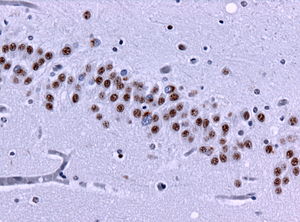TDP-43
Jump to navigation
Jump to search
| TDP-43 | |
|---|---|
| Immunostain in short | |
 TDP-43 staining in FTLD-TDP43. (WC) | |
| Normal staining pattern | nuclear staining (physiological) |
| Positive | cytoplasmatic staining (pathological) |
TAR-DNA-binding Protein 43, abbreviated TDP-43 is a neuropathology immunostain used in neurodegenerative diseases.
- Nuclear staining.
Inclusion morphology
- fine / coarse skeins.
- dot-like.
- dense-round inclusions.
Inclusions found
- Frontotemporal dementias FTLD TDP-43 [1]
- Alzheimer disease.[2]
- Chronic traumatic encephalopathy (CTE).[3]
- Lewy body disease (LBD).[4]
- In 30% of non-demented individuals 65yrs and older.[5]
- Inclusion body myositis (IBM).[6]
Images
See also
References
- ↑ Neumann, M. (Jan 2009). "Molecular neuropathology of TDP-43 proteinopathies.". Int J Mol Sci 10 (1): 232-46. doi:10.3390/ijms10010232. PMID 19333444.
- ↑ Wilson, AC.; Dugger, BN.; Dickson, DW.; Wang, DS. (Jan 2011). "TDP-43 in aging and Alzheimer's disease - a review.". Int J Clin Exp Pathol 4 (2): 147-55. PMID 21326809.
- ↑ McKee, AC.; Cairns, NJ.; Dickson, DW.; Folkerth, RD.; Keene, CD.; Litvan, I.; Perl, DP.; Stein, TD. et al. (Jan 2016). "The first NINDS/NIBIB consensus meeting to define neuropathological criteria for the diagnosis of chronic traumatic encephalopathy.". Acta Neuropathol 131 (1): 75-86. doi:10.1007/s00401-015-1515-z. PMID 26667418.
- ↑ Ling, H.; Kara, E.; Bandopadhyay, R.; Hardy, J.; Holton, J.; Xiromerisiou, G.; Lees, A.; Houlden, H. et al. (Dec 2013). "TDP-43 pathology in a patient carrying G2019S LRRK2 mutation and a novel p.Q124E MAPT.". Neurobiol Aging 34 (12): 2889.e5-9. doi:10.1016/j.neurobiolaging.2013.04.011. PMID 23664753.
- ↑ Wilson, AC.; Dugger, BN.; Dickson, DW.; Wang, DS. (Jan 2011). "TDP-43 in aging and Alzheimer's disease - a review.". Int J Clin Exp Pathol 4 (2): 147-55. PMID 21326809.
- ↑ D'Agostino, C.; Nogalska, A.; Engel, WK.; Askanas, V. (Apr 2011). "In sporadic inclusion body myositis muscle fibres TDP-43-positive inclusions are less frequent and robust than p62 inclusions, and are not associated with paired helical filaments.". Neuropathol Appl Neurobiol 37 (3): 315-20. doi:10.1111/j.1365-2990.2010.01108.x. PMID 20626631.
